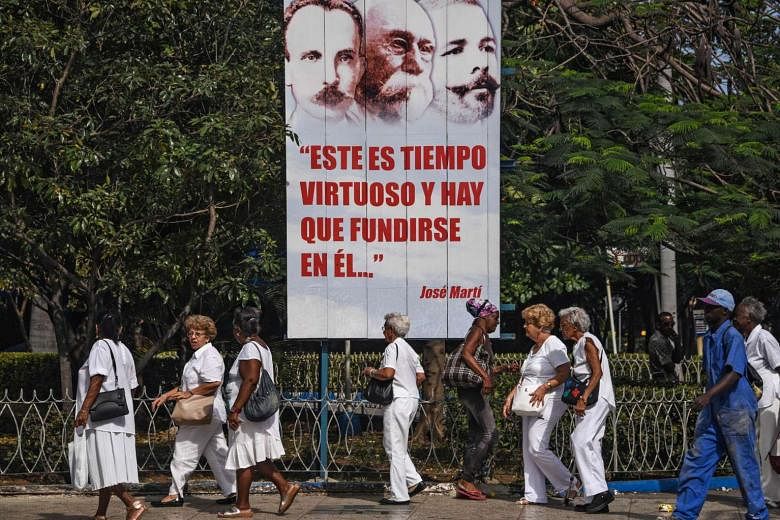HAVANA • Many nations have attempted the transition from revolutionary socialism towards some form of democratic capitalism; Cuba just happens to be the final one.
The country has many things going against it as it tries to make the journey. It suffers from the dysfunctions that afflict countries that have giant bureaucratic states lying heavy on society. Those at the top have been trained all their lives to regulate and control. The governing elites speak (at great length) in lifeless ideological jargon.
The current government slogan - not without haste but without pause - suggests a steady reform process but, in fact, the old people running this effort are halting and glacial. The world is changing Cuba faster than the Cuban state can cope.
The neighbourhoods feel warmer and more communal than those in many other nations, but there are certainly a lot of young men lethargically hanging about all day without much to do.
Independent civic institutions are scarce. The young people, local scholars say, are disillusioned with all systems. They hope technology will save them, or that moving abroad will.
But there is one big thing Cuba definitely has going for it: national pride. One encounters a fierce love of country, a sense of national solidarity and a confident patriotic spirit that is today lacking in the United States.
The patriotism has prickly manifestations. Cuban officials drop random Bay of Pigs references into their conversations with Americans, just for the ornery satisfaction of it. There is also a pervasive (and sometimes completely unhelpful) sense of Cuban exceptionalism; the idea is that no other model quite fits Cuba because the place is so remarkably distinct.
But there are glorious manifestations. A lot of that national pride is based on cultural achievements.
I am here with the President's Committee on the Arts and the Humanities, part of US President Barack Obama's reconciliation with Cuba. Musicians like Smokey Robinson, Dave Matthews, Joshua Bell, John Lloyd Young and Usher and creative types like playwright John Guare and choreographer Martha Clarke, got to interact with their Cuban counterparts, while government officials negotiated future exchanges.
This is the way to see Cuba at its best. The artistic community is consistently dazzling. It's not only the high artistic standards. There is also a radiating joy in performance that glows out of each artist, a blaze from something deep in the Cuban soul.
But Cuban national pride has another source: the 19th-century poet and journalist Jose Marti. I was amazed how much Marti's name came up in conversation here and how little Fidel Castro's did. Marti is the national poet, the one who shifted the national imagination, who told Cubans who they were and what their story was. He inspired a common faith in a dignified future.
One foundation head told me: "When I'm depressed, I try to read something Marti wrote. He's a father who embraces you. I think he engages the best of Cuba."
Marti taught by example, fighting for Cuban independence all his life. He was jailed in Cuba and exiled to Spain and elsewhere. He lived a good chunk of his life in the US, fighting US imperialism but writing admiring essays on Whitman, Emerson and the Brooklyn Bridge. He excelled at prose, poetry and political organisation. He died in battle, fighting for Cuban independence from Spain.
He also taught through his writing, which is quoted on all sides. He believed in an independent Cuba, a moderate and democratic political system with protections to tame capitalism. His love of Cuba caused him to love all Cubans. He spent much of his life trying to unite and reconcile them. "Absolute ideas must take relative forms if they are not to fail," he wrote.
But he was not primarily a systematic or programmatic thinker. "The problem of independence is not a change in form but a change in spirit," he believed. He fired patriotism and self-confidence. He found inner fulfilment by serving a national project and envisioning a national purpose.
It's hard to be too optimistic about Cuba's short-term future. The leaders are trying to square the mother of all circles - to have a rich society but without rich people; to have an entrepreneurial class but without losing the egalitarian solidarity; to have revolutionary socialism and also outside investment and growth, risk-taking and enterprise.
But it's exciting to see a nation that has a palpable sense of its own soul. It's interesting to see what a powerful force a national poet can be. Long dead, Marti is a precious resource who unifies amid disagreement and fortifies in hard times.
Every nation needs to know who it is and what its collective story is. I wonder if the current US malaise has something to do with the way we have lost touch with our own national poets, or even a common sense of who they might be.
NEW YORK TIMES

